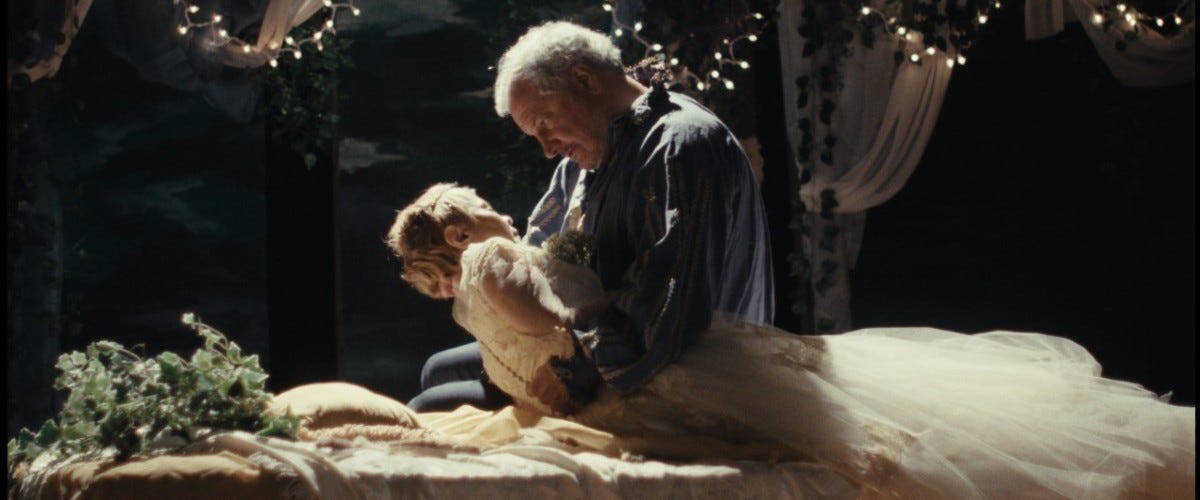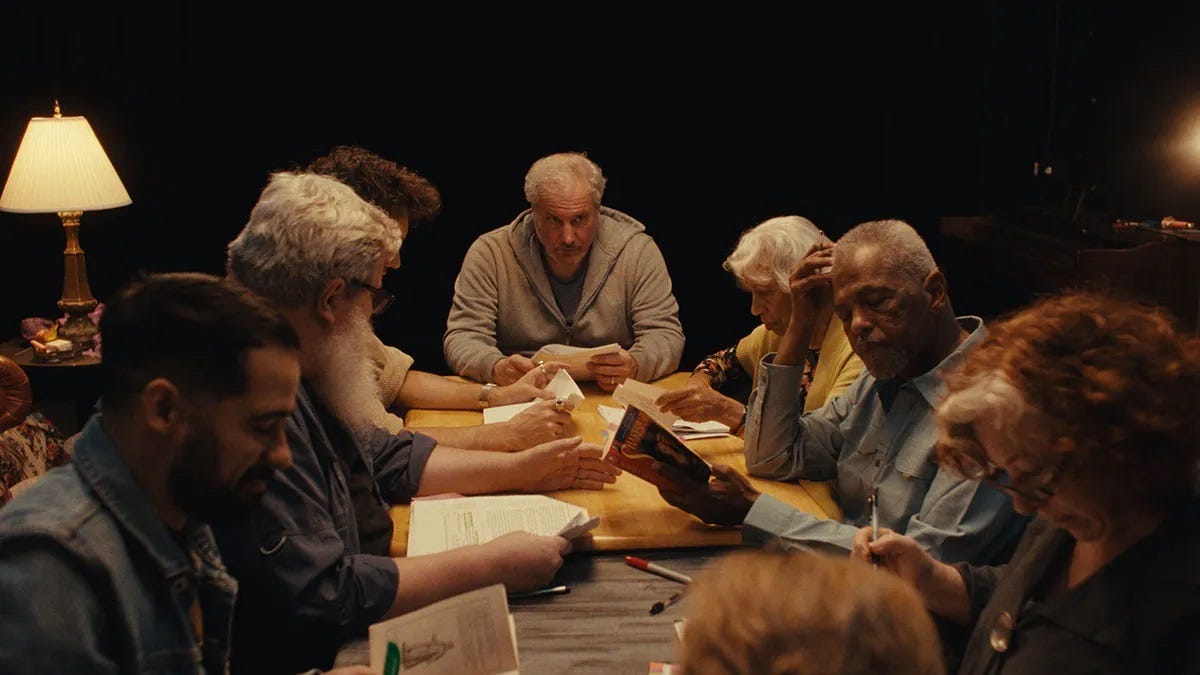Ghostlight (2024)
A family in pain and a comically klutzy acting troupe come to each other's rescue
An older Juliet (Dolly De Leon) and Romeo (Keith Kupferer) create unexpected stage magic
Ghostlight (2024)
In theaters
Is Ghostlight 2024’s little movie that could? That antic notion began flickering in my head a half-hour in, and it flooded my senses as I left the theater.
The movie’s subject is a fractured family coming apart. The peril they face quickly pulled me in. I couldn’t look away from these three sad, struggling people or the funny, sweet acting troupe they inadvertently stumble across.
In Chicago we first meet construction worker Dan (Keith Kupferer, in a galvanizing lead performance, one of the most shattering I’ve seen this year) looking somber under a hard hat as he manhandles an earsplitting jackhammer.
Incomprehensibly, a gorgeously rendered “Oh What a Beautiful Morning”, from Oklahoma!, shimmers on the soundtrack.
Dan’s morning is lousy. Concentrating is hard because of his fractious home life. He, his wife Sharon (Tara Mallen) and their teenaged daughter Daisy (Katherine Mallen Kupferer) can’t stop screaming at each other.
Daisy is acting out violently at school and none of them can calm down long enough to listen and speak to each other sympathetically. Only gradually do we learn what’s gnawing at them.
As Dan loudly drills on the street, he’s confronted by Rita (Dolly De Leon). Tart-tongued Rita is a Filipino actress well into her 50s who profanely reads the riot act to Dan for the racket his jackhammer is making. Doesn’t he understand that he’s interfering with the creation of art?
De Leon, herself a formidable Filipino actress with crack timing, makes Rita a wise seer and a barbed wisecracker all at once. Rough Dan is just the challenge this theatrical survivor is up for.
It turns out that Dan’s street-repair site is right next to a storefront that’s serving as a rehearsal space for a small theater company. Its members are non-professionals except for Rita and the company’s savvy, seasoned director Moira (Hanna Dworkin, in a gemlike rendition of a weathered theatrical veteran).
These two pros are trying to whip the amateurs into shape for a one-night performance of Romeo and Juliet.
The elements in this scrappy tale of regular folk beating the odds are basic, readily understood, and rewarding when explored with the compassionate but unsentimental care they get here.
When the young actor playing Romeo storms out, complaining that Rita is “too old” for him to convincingly kiss, Rita and Moira get an idea. A curious Dan wanders into the storefront and the two theatrical war-horses, a gleam in their eyes, plead with him that they desperately need an “old” Romeo.
To his own astonishment, Dan, suspended from his job for throwing a loud fit and needing relief from his family’s sturm und drang, says yes. He’s never read or seen the play. So, he can’t know that Shakespeare’s powerful rendering of fierce love, clashing families and youthful suicide are the very pricks tearing at his family.
It’s not an easy time. Dan, Sharon and Daisy are the plaintiffs in a costly lawsuit the family can barely afford to bring. A year before, the couple’s teenaged son, Daisy’s brother, committed suicide.
The young girl intending to join him in the suicide pact survived. She supplied the fatal capsules, and now she and her parents are the defendants in the lawsuit.
Depositions will make for raw confrontations. The impending ordeal is made worse because Dan still won’t openly grieve for the loss of his son, and he rages or coldly withdraws whenever Sharon and Daisy urge him to accept what they’ve all lost.
“I miss him so much,” Daisy tearfully tells her father, and Dan silently turns away, unable even to bear her saying the words.
So, we have a trembling family and a shaky theater company both trying to keep it together. To their enormous credit, co-directors Kelly O’Sullivan and Alex Thomson, working from O’Sullivan’s sensitive script, riskily let the two struggles unfold side by side, then merge.
A puzzled, nervous Dan (Keith Kupferer) trying in a table read to become Romeo
And, most surprisingly, they lend aid and insights to one another. It’s a disarming, altogether unpredictable fusion.
The theatrical dare is sprightly and comic, about a fragile, ragtag theater troupe trying to put on a show, summoning just enough jittery dignity to pull it off.
The domestic strife is near calamitous, about a fearful family repressing its pain, which is due to spill out in a court of law. When both parents and their daughter gravely doubt that such a public airing will do them any good.
Combining these two force fields is this knotty script’s delicate balancing act. It moves back and forth between family and acting troupe with enough variation and flair to throw a curveball midway and make it land solidly.
Specifically, well into the dual conflicts we learn that Daisy has acted in high school and knows Shakespeare’s play. When the troupe also casts her in the production, Sharon sees that a surcease of sorrow for her family is possible, and she steps in to help make it happen.
Katherine Kupferer is fiercely, movingly focused as the tormented Daisy. The actress and the character both keep us on edge wondering whether fury and vulnerability, fighting it out inside her, will leave Daisy whole.
And Tara Mallen is sorrowful and finally steely as Sharon, trying to push Dan and Daisy to reconcile, refusing to let their bitterness sink her, too. It’s a valiant portrayal of a pivotal wife and mother enduring more anguish than anyone should be asked to.
The elements in this scrappy tale of regular folk beating the odds are basic and readily understood. But the unsentimental cracking-open they get here wasn’t a sure thing.
A family is in paralyzing denial. A gaggle of older, barely competent semi-actors refuses to concede that they can’t make artistic magic.
Their combined uphill struggle turns Shakespeare’s final line, “For never was a story of more woe than this of Juliet and Romeo”, on its head. They’ve transformed woe into a thankfully less than tragic – actually jubilant – wonder.





